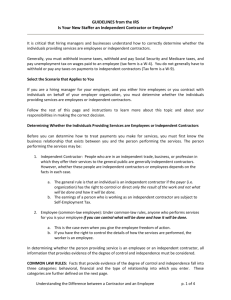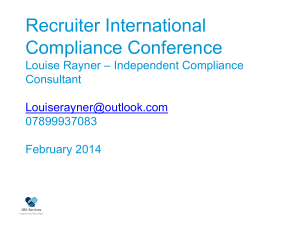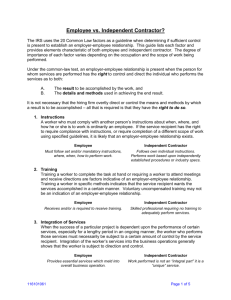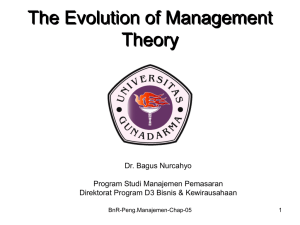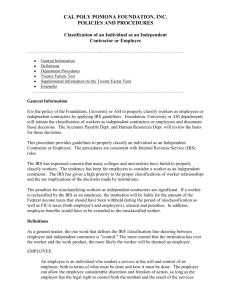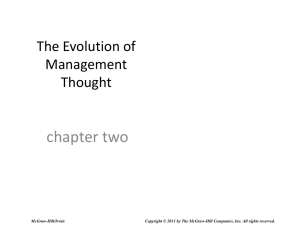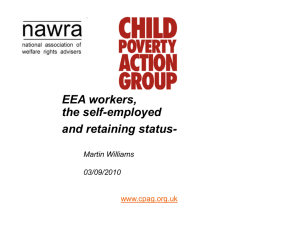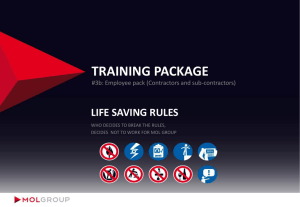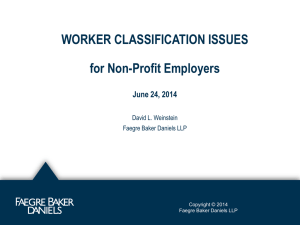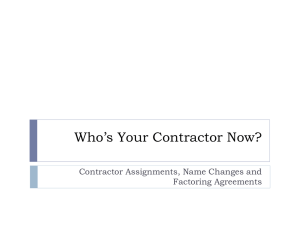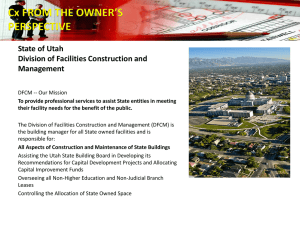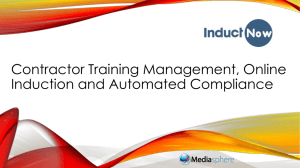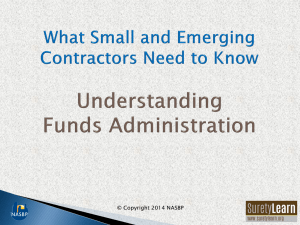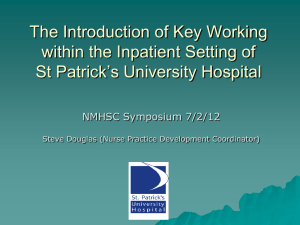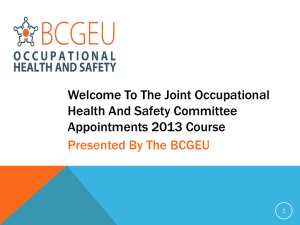Employees Vs. Independent Contractors
advertisement
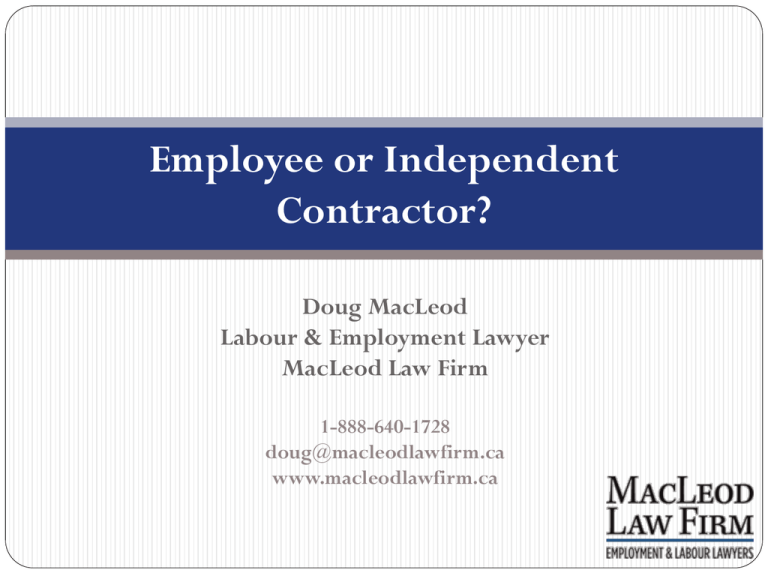
Employee or Independent Contractor? Doug MacLeod Labour & Employment Lawyer MacLeod Law Firm 1-888-640-1728 doug@macleodlawfirm.ca www.macleodlawfirm.ca Situations When the Employee/Independent Contractor Issue Arises: The Canadian Revenue Agency believes it is owed payroll taxes Person applies for employment insurance benefits Person claims for workers compensation benefits Persons claims for vacation pay, overtime pay, or termination pay under the Employment Standards Act Person claims damages for a violation of the Ontario Human Rights Code Factors to Consider: The Intent of the Parties Matters Have both parties expressed an intention to create an independent contractor relationship in a written contract? Have the actions within the relationship been consistent with the independent contractor agreement? An independent contractor relationship does not exist merely because the parties choose to describe it to be so The Wiebe Door test “…there is no universal test to determine whether a person is an employee or an independent contractor [but that] …the central question is whether the person who has been engaged to perform services is performing them as a person in business on his own account. In making this determination, the level of control the employer has over the worker’s activities will always be a factor. However, other factors to consider include whether the worker provides his or her own equipment, whether the worker hires his or her own helpers, the degree of financial risk taken by the worker, the degree of responsibility for investment and management held by the worker, and the worker’s opportunity for profit in the performance of his or her tasks.” Weibe Factor: Level of Control Does the employer control the “where, when and how” of the performance of the work/services? The right to direct and supervise a person is one of the hallmarks of an employer/employee relationship. Is anyone overseeing the person’s activities? Does the person decide when the work is performed Can he/she refuse to do the work? The “right to control” the person is considered as opposed to the “actual control” that is exerted over the person. When an independent contractor is performing the same services as employees, is the person subject to the same level of control as the people providing the same kind of work/services? Less control exists when a person can hire a substitute to do the work/services. Weibe Factor: Ownership of Tools Who owns and provides tools and equipment to accomplish the work? Who has contractual responsibility for an asset in a rental or lease situation? How significant is the investment in the tools? Who is responsible for the cost of replacement, repair and insurance? The ownership of tools and equipment by a worker is more commonly associated with a business relationship. Weibe Factor: An Opportunity for Profit and Risk of Loss in the Performance Tasks Did the person have an opportunity to negotiate the fee for services? If the person is paid a fixed rate, did that person have an opportunity to sub-contract the work to another person for a lower rate? If the person is compensated by a flat fee, does the person incur expenses in performing the services? Does the person have expenses directly related to their employment (such as automobile expenses, board and lodging costs, etc.)? This factor has to be considered from the worker’s perspective; that is, to what extent can the worker control his/her proceeds and expenses. Case Study 1 – TBT Personnel Services Inc. The company hired 96 truck drivers as independent contractors to carry steel (53 were not incorporated and 43 were incorporated). The MNR found all truckers were employees for the purposes of the EIA and the CPP. The company appealed. Intention - the intent of the incorporated Workers and the Appellant was that the Workers who had signed these contracts had the intention of being independent contractors. Control test – I have concluded that the Workers who were incorporated were not caught by the control test and were therefore not employees of the Appellant. Decision – Appeal partly allowed. The 43 Workers who have signed agreements with the Appellant to have their limited company provide truck driving services to the Appellant were found to be independent contractors. The 53 unincorparated drivers were found to be employees. Case Study 2 – Scarborough Centre for Healthy Communities The MNR found a family doctor to be an employee and the organization ordered to pay EI and CPP premiums for a 3 year period. The organization appealed. Intention – Originally, the doctor was retained as a replacement for doctors who were away. At the time, he signed an acknowledgement that he was engaged as an independent contractor and that no source deductions would be made. Later he started providing services one day a week. Control - I would first comment that the nature of the work performed by Dr. Hirshfeld was very similar to that performed by employed physicians, except that Dr. Hirshfeld only worked one day a week. On the other hand, I accept the appellant’s submission that Dr. Hirshfeld was not subject to the same level of control as the employed physicians. He was not present for many of the staff meetings and it is reasonable to conclude from the evidence as a whole that employed physicians were expected to take more direction from the organization generally. Decision – Appeal was successful Case Study 3 – Patrick Gonsalves The MNR assessed the Company approximately one million dollars for unpaid premiums and contributions, for the two year period under review in connection with 287 sales representatives. The Company provided medical sales representatives to its clients, which are all multinational pharmaceutical companies. The representatives visit doctors to introduce and explain, or “detail” the clients’ pharmaceutical and other products Intent - the Company entered into Representative Agreement with the workers which all express a clear mutual intent that the sales representatives be independent contractors responsible for their own source Control - with few exceptions the sales representatives were left on their own in their designated territories, and were free to set their own hours, so long as the frequency of calls upon their target audience as required by the client, was maintain. Ownership of tools - The workers provided their own vehicles. There is no evidence that the Company provided the sales representatives with any equipment whatsoever. Opportunity to profit & Risk of Loss-The monthly dedicated sales representatives had the ability to negotiate their remuneration depending on their experience and number of years in the industry. The sales representatives had a chance to profit by sound management. An indemnity clause in the contract subjects the representatives to financial risk. Decision – Appeal was successful. How to Minimize the Risk that a Person will be Found to be an Employee Enter into a written contract Make sure the contract addresses each of the 4 factors that are considered Make sure the contract includes a termination clause Make sure the parties act consistently with the terms of the contract Make sure the contractor is registered with the CRA Make sure the contractor charges applicable taxes Make sure the contractor has insurance to cover workplace injuries Advanced Ruling If a worker or payer is not sure of the worker’s employment status, either party can request a ruling to have the status determined. A ruling states whether a worker is an employee or is self-employed, and whether or not that worker’s employment is pensionable or insurable. Resources Canada Revenue Agency http://sbinfocanada.about.com/gi/o.htm?zi=1/XJ&zTi=1&sdn=sbinfo canada&cdn=money&tm=34&f=00&su=p284.13.342.ip_&tt=2&bt=1 &bts=1&zu=http%3A//www.craarc.gc.ca/E/pub/tg/rc4110/README.html Workplace Safety & Insurance Board http://www.wsib.on.ca/en/community/WSIB/OPMDetail?vgnextoid =5583fcea9bfc7210VgnVCM100000449c710aRCRD Thank You For Joining Us! If you have any further questions, please feel free to contact me at your convenience: Email: doug@macleodlawfirm.ca Phone: 1-888-640-1728 www.macleodlawfirm.ca


